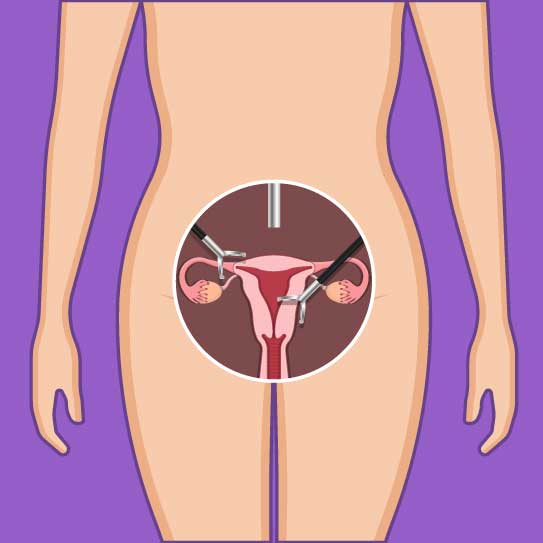
Gurgaon
USFDA Approved Procedures
Minimally invasive. Minimal pain*.
Insurance Paperwork Support
1 Day Procedure

Pristyncare%20Clinic.webp)
Pristyncare%20Clinic.webp)
Pristyncare%20Clinic.webp)
In some women, the uterus rather falls down from its original position and causes difficulty in urination and defecation along with repeated urinary tract infections. This is called uterine prolapse. At either of these times, Hysterectomy, that is, the removal of the uterus becomes essential. It provides the final and definite solution to uterine conditions and promises immediate relief.
(Note, Hysterectomy is also performed as a final solution to endometriosis and is a fairly common and safe surgery. However, it invariably ends your biological capacity to birth a child. Therefore, if you desire further childbirth, we suggest you consult more than 1 doctor and assess all alternative treatment options.)


Hysterectomy : Types and Procedure
Hysterectomy can typically be performed in three ways:
Abdominal Hysterectomy: Here, your gynecologist makes an open cut incision in your lower abdomen and manually removes the uterus. The site is then closed with self-dissolving sutures and substantial recovery can be expected in 5-6 weeks.
Vaginal Hysterectomy: This method is particularly performed only in cases of uterine prolapse. Here, your gynecologist removes the already prolapsing uterus from the vaginal route. Post excision, fine absorbable sutures are made close to the surgical site. The procedure is comparatively simpler to abdominal Hysterectomy and substantial recovery can be expected in 1-2 weeks.
Total Laparoscopic Hysterectomy (TLH): Here, the uterus removal is performed using an advanced medical tool- a laparoscope, that is, a tiny, specialized catheter with a camera and light on its end.
First, your gynecologist makes 4-5 keyhole-sized ports in your lower abdomen and inserts a laparoscope. The laparoscope gives a magnified view of the otherwise smaller and narrower organs. It thus helps your surgeon achieve more precision with better clarity.
The uterus and its supporting organs are then separated using ultrasonic energy to minimize blood loss. Once separated, the uterus is removed through the vaginal route. While most of the laparoscopic keyholes (lesser than half an inch) heal by themselves, the one keyhole larger than 1 cm, is closed with a suture. Few sutures are also made at the birth canal route. However, they are very few in comparison to abdominal Hysterectomy and recovery can be expected within 1-2 weeks.


 NABH
NABHPristyn Care Diyos Super-Speciality Hospital is committed to redefining modern healthcare by blending cutting-edge technology with compassionate, patient-first care. Located in the heart of Safdarjung Enclave, South Delhi, our NABH-accredited facility offers advanced treatment solutions across multiple specialties, ensuring superior outcomes and faster recoveries.
Our dedicated team of doctors at Pristyn Care Diyos Hospital aims to streamline the entire patient journey—from consultation to recovery—by providing seamless, end-to-end medical care tailored to each individual’s needs.
We offer specialised medical services across a wide range of fields, including urology and andrology, general and laparoscopic surgery, cosmetic and plastic surgery, gynaecology and urogynaecology, orthopaedics, neuro and spine surgery, ENT (ear, nose, and throat), oncology, internal medicine, and critical care. Our facility also extends home care services for enhanced convenience and continuity of care.
The suites and patient rooms at the Hospital are thoughtfully designed to ensure a comfortable and healing environment, featuring modern amenities, hygienic surroundings, and attentive support for both patients and their attendants.
Supported by a skilled clinical team and world-class infrastructure—including modular operation theatres with HEPA filters, advanced diagnostic labs, and high-end medical equipment— Pristyn Care Diyos Hospital stands as a trusted destination for safe, effective, and personalised healthcare.
...Read More


 NABH
NABHPristyn Care Sheetla Hospital in Gurgaon makes quality healthcare more accessible and personal. The hospital offers advanced treatment across various specialties like women’s health, child and neonatal care, etc. and minimally invasive surgery. With 36 well-equipped beds, 3 modern operation theatres, and a dedicated ICU, Pristyn Care Sheetla works with comfort and efficiency. With 90+ experienced doctors and a courteous professional medical team, we ensure clear communication, personalized care, and real results – so you feel supported every step of the way.
...Read More
Certified Female Gynecologists. Quick & Rapid Recovery.
Our team consists of the top gynecologists in India with extensive experience in performing ovarian cyst surgery and ensuring the patient faces minimal discomfort in the process.
To help patients manage the expense of ovarian cyst treatment, we provide No-Cost EMI offers. By availing of these offers, patients can pay for their ovarian cyst surgery in convenient and affordable monthly installments.
Pristyn Care offers a cashless payment option for cutting-edge uterus removal surgery as part of its commitment to ensuring that patients have a seamless surgical experience.
We offer free follow-up consultations and instructions including dietary tips as well as exercises to every patient to ensure they have a smooth recovery to their daily routines.
Uterus removal surgery (Hysterectomy) typically costs anywhere between INR 40,000 to INR 70,000 in Gurgaon. This cost varies based on the method of surgery you choose (conventional or laparoscopic ), choice of hospital, and the experience of the operating surgeon. As a rule of thumb, the more advanced the surgery type and the more experienced your doctor, the higher are the charges of the treatment.
Pristyn Care-associated hospitals are some of the most advanced and dependable hospitals for Hysterectomy surgery in Gurgaon. This is because we offer:Most advanced Hysterectomy method- total laparoscopic Hysterectomy (TLH).We accept all forms of payment methods including cash, card, insurance cases, and EMI. method.We have both-private and deluxe rooms.Our vicinity is COVID safe.We are fully staffed, have a patient-friendly infrastructure, and pride ourselves on seamless administration.With 700+ hospitals pan India, chances are, we are associated with some of the major hospitals near you. Simply call us directly to know your nearest Pristyn Care-associated hospital.Also, we provide transportation to ensure a tension- patient experience.
The number of days required for hospitalization depends on the type of Hysterectomy. While conventional Hysterectomy (open-cut surgery) requires a hospital stay of 2-3 days, you may be relieved the next day in case of laparoscopic Hysterectomy.
Yes. Hysterectomy is a major surgery performed only under acute medical necessity. Therefore, most insurance providers cover its cost under insurance. However, if it is a case of reimbursement, please check with if the said hospital is on your SGHS/ CGHS/ or company panel. Please feel to discuss the same with our doctors/ medical coordinators.
Uterus removal surgery is a slightly delicate procedure and may take anywhere between 1-3 hours. This time varies on your individual health condition, type of surgery, method of surgery, and surgeon’s past experience.
Uterus removal, that is, Hysterectomy is a major surgery that demands substantial bed rest and healing time. While a good recovery can be expected only after 5-6 weeks in cases of conventional Hysterectomy, this time reduces to 1-2 weeks in case of laparoscopic Hysterectomy.
No. The uterus removal itself does not have any major side effects. In fact, it would resolve the intense pain and bleeding you were feeling otherwise and the body would slowly adjust to the changed anatomy. However, if the surgery is performed wrong or any other internal complications are discovered, it may result in-Injury to nearby organs like bladder, urethra, blood vessels, and nerves.Heavy bleedingBlood clots in the legs or lungsInfection
Yes, you can very well have and enjoy sex despite a Hysterectomy. The surgery only removes the uterus. The desire to have sex is rather stimulated by hormones produced in the ovaries and enjoyed through the sensations registered in the vaginal tract and walls. Since neither of them is affected in the Hysterectomy, the surgery does not restrict your sex life. However, do wait for 1-1.5 months before engaging in penetrative sex. This time period would allow you to properly heal through the physical pain, as well as emotional and mental changes.
A hysterectomy is often considered when other treatments have not been successful. Common medical conditions that may lead to the need for a hysterectomy include:
Laparoscopic hysterectomy is a modern, minimally invasive surgery that provides several advantages over traditional open procedures. These include:
While some causes of hysterectomy are unavoidable, there are several ways to reduce the risk of needing this surgery:
Choosing to delay or avoid a medically advised hysterectomy can lead to serious complications, especially if the underlying condition progresses. Potential risks include:
| Sr.No. | Doctor Name | Ratings | Experience | Address | Book Appointment |
|---|---|---|---|---|---|
| 1 | Dr. Aria Raina | 4.6 | 12 + Years | A1/26, adjacent to Green Fields Public School | Book Appointment |
| 2 | Dr. Biplab Mukhopadhyay | 4.6 | 20 + Years | 29, Ring Road, Block L, Lajpat Nagar, New Delhi | Book Appointment |
| 3 | Dr. Aastha Agarwal | 4.6 | 17 + Years | -- | Book Appointment |
| 4 | Dr. Mannan Gupta | 5.0 | 15 + Years | 29, Ring Road, Block L, Lajpat Nagar, New Delhi | Book Appointment |
| 5 | Dr. Priya Shikha Modi | 4.6 | 15 + Years | -- | Book Appointment |
| 6 | Dr. Preeti Mehra | 4.6 | 14 + Years | -- | Book Appointment |
| 7 | Dr. Vikas Yadav | 4.6 | 13 + Years | -- | Book Appointment |
| 8 | Dr. B Preethi | 4.6 | 11 + Years | -- | Book Appointment |
| 9 | Dr. Swati Chhabra | 4.6 | 8 + Years | -- | Book Appointment |
PJ
Recommends
Surgery was really good.
.svg)
.svg)
.svg)